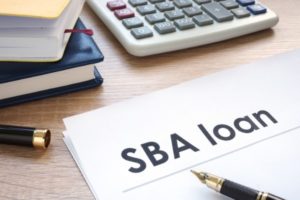With the enactment of the Coronavirus Aid, Relief, and Economic Security Act (CARES) Act, Congress appropriated $350 billion for Small Business Administration (SBA) Paycheck Protection Loans of up to $10 million to small businesses impacted by COVID-19. The Act also appropriates $10 billion for SBA Economic Injury Disaster Loans of up to $2 million to small businesses impacted by natural disasters, which now include the COVID-19 pandemic, modifying this program accordingly.
While the CARES Act allows businesses that already have received or been approved for an Economic Injury Disaster Loan to apply for a Paycheck Protection Loan if it will not duplicate their use of the Economic Injury Disaster Loan, applicants may want to contact a tax professional to ensure that they are meeting all the requirements of the program.
*The Act appropriates $350 billion for “Paycheck Protection Loans” for small businesses, including up to $10 million per company for companies with fewer than 500 employees. The Act also makes $10 billion available to the SBA’s existing Economic Injury Disaster Loans for companies impacted by COVID-19 and substantially modifies the rules for such loans.
Section 1102 of the CARES Act addresses the “Paycheck Protection Program,” thus amending Section 7(a) of the Small Business Act to make loans up to $10 million available until June 30, 2020, to existing “small businesses,” a term defined under the Act as companies of up to 500 employees and their “affiliates,” entities under common ownership or control, unless an applicable size standard for an industry allows for a greater number of employees. However, there is a cap on the maximum amount of loans to be issued.
Hotel and restaurant chains may qualify for these loans as the Act additionally waives SBA “affiliation” rules for industry “Sector 72,” which applies to Accommodation and Food Services. Businesses in this sector may qualify for new loans provided they do not have more than 500 employees at any given location.
The SBA’s affiliation rules also are waived for franchises that are approved on the SBA’s Franchise Directory, and small businesses that receive financing through the Small Business Investment Company program.
These loans may be used to cover certain business costs, including payroll costs, employee benefits, mortgage interest payments, rent, and utilities. The Act waives the requirement for applicants to demonstrate that they are unable to obtain credit from other sources, as well as the personal guaranty requirement usually associated with Section 7(a) loans. The Act also mandates that the SBA has no recourse against any individual shareholder, member or partner of a loan recipient unless the loan is used for an unauthorized purpose.
It is important to note that eligible borrowers are required to make good faith certifications that they have been impacted by COVID-19 and will use the loan funds to retain workers and maintain obligations related to payroll and other debts.
Perhaps, more importantly, the Act provides that the federal government will forgive the amount of a loan under the Act that a borrower can document was used to pay: (1) payroll costs; (2) mortgage interest; (3) rent and (4) utilities. In each of these cases, this lasts for up to eight weeks following the issuance of the loan.
Interest for the Paycheck Protection Loans right now seems to be one percent and that payment of the loans shall be deferred for no less than six months and no more than one year.
*The Act allows a company that already has or is applying for a Section 7(b) Economic Injury Disaster Loan to also apply for a Paycheck Protection Loan if it will not duplicate the applicant’s use of the Disaster Loan.
The CARES Act also contains language that alters the SBA’s existing Economic Injury Disaster Loan program. The program operates pursuant to Section 7(b) of the Small Business Act and provides low-interest (3.75 percent for small businesses and 2.75 percent of nonprofits) long-term loans to small businesses located in areas that SBA has declared to be geographic disaster zones. Section 1110 of the CARES Act provides that SBA Disaster Loans, as modified by the CARES Act, will be available until December 31, 2020.
The Act similarly changes the definition of “small business,” for the purposes of a Disaster Loan, to include a company with no more than 500 employees but does not waive the affiliation rules for Sector 72. The Act also waives the personal guaranty requirement and the requirement for applicants to demonstrate that they are unable to obtain credit from other sources.
The Act provides for a $10,000 emergency advance grant within three days of submitting an application while such an application is pending, for which the SBA will not require repayment. If an applicant later receives a 7(a) loan, the amount of the advance will “be reduced from the loan forgiveness amount for a loan for payroll costs.”
Disaster Loans may be used to pay payroll, fixed debt, accounts payable, and other costs, but are not meant to replace lost sales or profits resulting from the COVID pandemic. Loan proceeds may not be used for certain purposes, including to refinance debt, make payments on loans owed by another federal agency, pay tax penalty obligations, repair physical damages, or pay dividends to stockholders.
These Disaster Loans also offer long-term repayments up to a maximum of 35 years. The terms of these loans are established on a case-by-case basis, based upon each borrower’s ability to repay. Eligibility is based on applicants’ having an acceptable credit history and the ability to repay the loan, being physically located in a declared a disaster area, and having suffered working capital losses due to the declared disaster, not due to a downturn in the economy or other reasons.
The SBA is also authorized by the Act to pass emergency regulations to implement the Act within 15 days after its enactment. If you have any questions about these important changes to SBA loans and how they may affect you, call The Gartzman Law Firm at (770) 939-7710.


